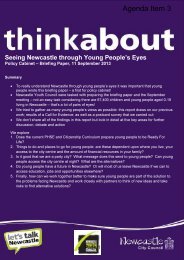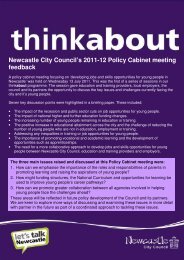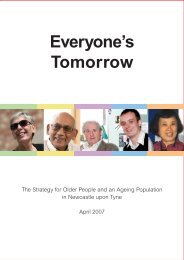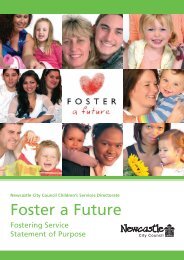NEWCASTLE'S MUSICAL HERITAGE AN INTRODUCTION By ...
NEWCASTLE'S MUSICAL HERITAGE AN INTRODUCTION By ...
NEWCASTLE'S MUSICAL HERITAGE AN INTRODUCTION By ...
Create successful ePaper yourself
Turn your PDF publications into a flip-book with our unique Google optimized e-Paper software.
to Handel Oratorios and I suspect the real reasons lay elsewhere. But the local<br />
press was in sympathy with the festival organisers. They ran a piece which in<br />
summary said that along with other admirers of the friendly and estimable<br />
character of Mr Meredith and of his wonderful powers they were sorry that he<br />
had suffered so considerably by an undertaking calculated to produce delight and<br />
universal gratification.<br />
The pecuniary failure of the 1796 Music Festival perhaps paralysed private<br />
enterprise, or the exciting events connected with the long, weary Peninsular War<br />
(between Wellington and Napoleon in the Iberian Peninsular) may have<br />
engrossed all attention, but it was not until the year peace was proclaimed in<br />
1814 that another venture was made – this time under the patronage of a<br />
committee of influential noblemen and gentlemen. It was agreed that one fifth of<br />
all the money taken during the festival was to be handed over to the funds of the<br />
Newcastle General Infirmary. This whole event seemed to be well organised and<br />
although the standard of the orchestra and the choral singing came in for some<br />
criticism the singing of the two principal artists, Madame Catalani and Mr<br />
Braham, was outstanding. Angelica Catalani dominated her period, in her early<br />
years, as no other singer had done since Mara. She was a sensation at her<br />
London debut in 1806, therefore, I think we can safely say that Newcastle heard<br />
her at her best at the 1814 Festival. The local press reports are glowing but the<br />
truth is she was of the old school and took great liberties with the composer’s<br />
music adding trills whenever it suited her. She was a forceful woman and (for<br />
political reasons) once told Napoleon to his face that she would not sing for him.<br />
She eventually went into opera management, about which her husband said that<br />
to run an opera house all that was needed was his wife and four or five puppets.<br />
Her tenor on this occasion, John Braham, was very popular with English<br />
audiences as a singer and a songwriter. He was born in London of Jewish<br />
parentage and made his stage debut at the age of ten. In his time he was one of<br />
the few singers this country had produced that could hold his own with the<br />
Italians and was consequently a great favourite at Covent Garden. He became<br />
so rich that he bought the London Colosseum and built the St James’ Theatre in<br />
London, both unsuccessful speculations as it turned out. The usual formula was<br />
followed throughout the festival with sacred music in church and secular in the<br />
theatre. As a grand finale a ball was held in the Assembly Rooms, ‘undertaken at<br />
the instance and for the benefit of the Chevalier de Valibregue’, who was none<br />
other than the husband and business agent of Madame Catalani. Significant of<br />
the times was a letter to the editor of the Newcastle Weekly Chronicle from an<br />
outraged Timothy Plain, in response to a performance by a lady solo violinist,<br />
Madame Gerbini. The irate Mr Plain said ‘It is unseemly as well as uncommon to<br />
behold a female playing the violin and prejudice will operate, along with her other<br />
defects, to prevent her retaining the good opinion of the public’. But in spite of the<br />
Timothy Plains the festival was well attended and the receipts exceeded £2,300,<br />
of which a clear fifth was given to the Newcastle Infirmary.<br />
31

















